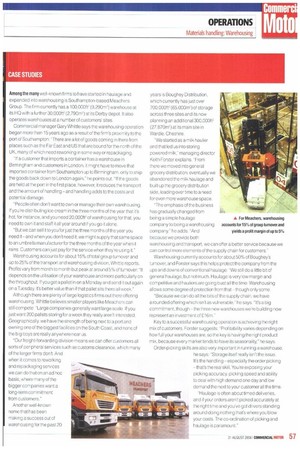CASE STUDIES Among the many well-known firms to have started
Page 57

If you've noticed an error in this article please click here to report it so we can fix it.
in haulage and expanded into warehousing is Southampton-based Meachers Group. The firm currently has a 100,000ft2(9,290m2) warehouse at its HQ with a further 30.000ft' (2,790m2) at its Derby depot. It also operates warehouses at a number of customers sites.
Commercial manager Gary Whittle says the warehousing operation began more than 15 years ago as a result of the firm's proximity to the port of Southampton: "There are a lot of goods coming in there from places such as the Far East and US that are bound for the north of the UK, many of which need reworking in some way or repackaging.
"It a customer that imports a container has a warehouse in Birmingham and customers in London, it might have to move that imported container from Southampton up to Birmingham, only to ship the goods back down to London again," he points out. "If the goods are held at the port in the first place, however, it reduces the transport and the amount of handling -and handling adds to the costs and potential damage.
"People often don't want to own or manage their own warehousing. If you're distributing ice cream in the three months of the year that it's hot, for instance, and you need 20,000ft2of warehousing for that, you need to own it and staff it all year around if you go it alone.
"But we can sell it to you for just the three months of the year you need it when you don't need it. we might supply that same space to an umbrella manufacturer for the three months of the year when it rains. Customers can just pay for the service when they're using it."
Warehousing accounts for about 15% of total group turnover and up to 25% of the transport and warehousing division, Whittle reports. Profits vary from month to month but peak at around 5% of turnover: "It depends on the utilisation of your warehouse and more particularly on the throughput. If you get a pallet in on a Monday and send it out again on a Tuesday. it's better value than if that pallet sits there all week."
Although there are plenty of large logistics firms out there offering warehousing. Whittle believes smaller players like Meachers can still compete: "Large companies generally want large scale If you just want 200 pallets storing for a week they really aren't interested. Geographically, we have the strength of being next to a port and owning one of the biggest facilities on the South Coast, and none of the big boys are really anywhere near us.
"Our freight-forwarding division means we can offer customers all sorts of peripheral services such as customs clearance, which many of the larger firms don't. And when it comes to reworking and repackaging services we can do that on an ad hoc basis, where many of the bigger companies want a long-term commitment from customers."
Another well-known name that has been making a success out of warehousing for the past 20
years is Boughey Distribution, which currently has just over 700,000ft2(65,000m2) of storage across three sites and its now planning an additional 300,000ft'' (27,870m2) at its main site in Wardle. Cheshire.
"We started as a milk haulier and that led us into storing powered milk,'' managing director Keith Forster explains. From there we moved into general grocery distribution eventually we abandoned the milk haulage and built up the grocery distribution side, leading over time to a need for even more warehouse space.
A For Meachers, warehousing accounts for 15% of group turnover and yields a profit margin of up to 5%
"The emphasis of the business has gradually changed from being a simple haulage company to being a warehousing company," he adds. "And because we provide both warehousing and transport, we can offer a better service because we can control more elements of the supply chain for customers."
Warehousing currently accounts for about 50% of Boughey's turnover, and Forster says this helps protect the company from the ups and downs of conventional haulage: "We still do a little bit of general haulage, but not much. Haulage is very low margin and competitive and hauliers are going bust all the time. Warehousing allows some degree of protection from that though only some.
"Because we can do all the bits of the supply chain, we have a rounded offering which isn't as vulnerable," he says. "It's a big commitment, though the three new warehouses we're building now represent an investment of Et 6m."
Key to a successful warehousing operation is achieving the right mix of customers, Forster suggests! :profitability varies depending on how full your warehouses are, so the key is having the right product mix, because every market tends to have its seasonality," he says.
Order-picking skills are also very important in running a warehouse, hie says: "Storage itself really isn't the issue. Its the handling especially the order picking that's the real skill. You're exposing your picking accuracy. picking speed and ability to deal with high demand one day and low demand the next to your customer all the time.
"Haulage is often about timed deliveries, and if your orders aren't picked accurately at the right time and you've got drivers standing around doing nothing that's where you blow your costs. The co-ordination of picking and haulage is paramount."


















































































































































































